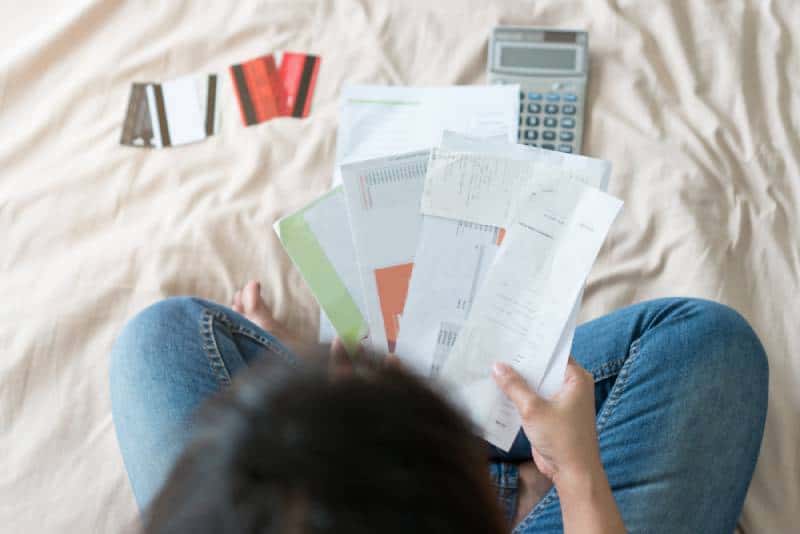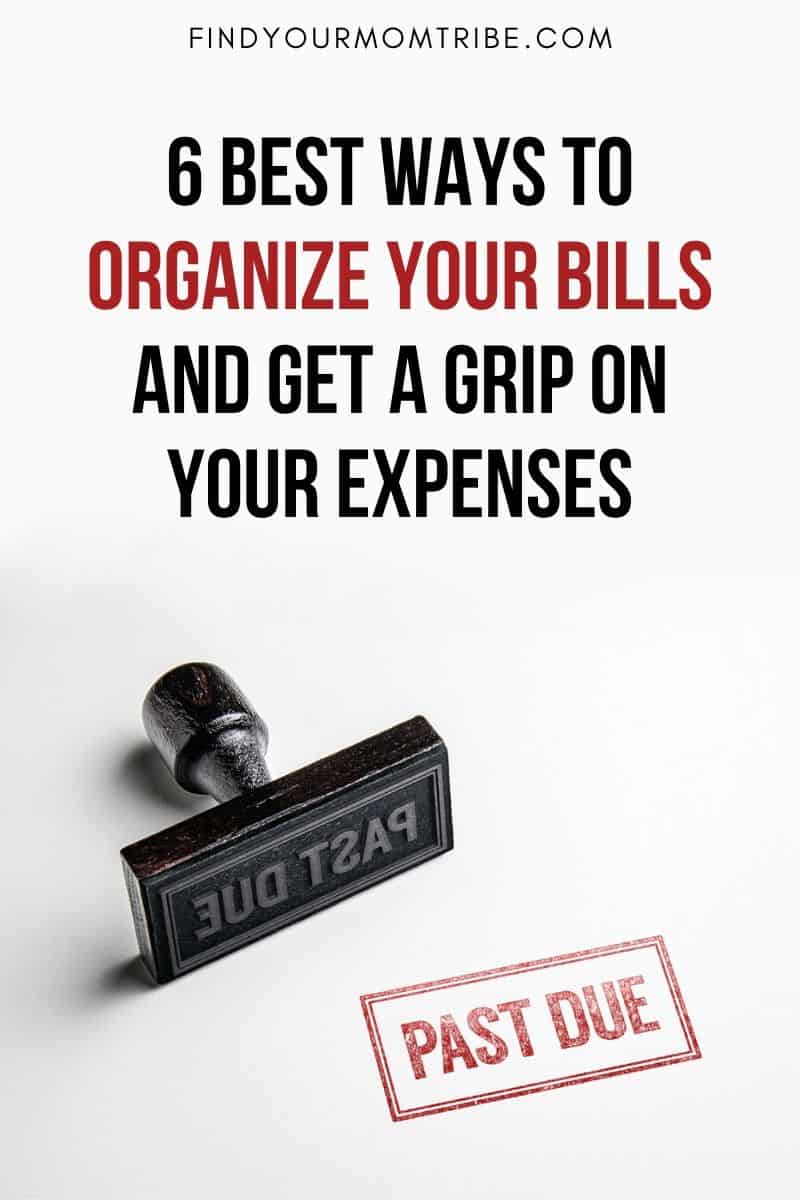Bills. No matter how you feel about them, they’re here to stay for the rest of your adult life, so you might as well learn how to deal with them, right?
And if you learn how to organize your bills correctly, you will be even closer to that goal.
To organize your bills means staying on top of all of your expenses, making sure everything is getting paid on time, and avoiding late fees.
This process will not only help you lead a more organized life, but it will also prevent debt from piling up and causing even more financial trouble down the road.
RELATED: Mistakes When Getting Out of Debt: 9 Mistakes To Avoid
What’s more, being organized in terms of your bills will help you stay on budget, since there will be no surprise bills making their way to your mailbox (or inbox) to put a dent in your monthly spending plan and personal finances.
Plus, this will help you feel more relaxed and organized in your day-to-day life. So, let’s get your bills in order!
1. Make a list of all of your bills
The first step to organizing your bills is to actually sit down and create a list of every bill that you pay, while also noting how much you pay if the bills are fixed (if not, try and figure out a range, such as $80 to $100 for power).
This will include utility bills, mortgage payments, credit card payments, and so on.
Then, make a note of how you receive your bills. Some might arrive by regular mail, some can be automatic, and some can arrive online.
Think about what your preferred method of receiving bills is, and whether you can talk to a service provider to change from regular mail to email, for example.

If you have any bills that are paid automatically, make sure to note when the money gets drafted from your bank account.
If you can’t remember or aren’t sure, you can take a look at your bank statement for the previous month.
Especially when it comes to bills that are paid automatically from your bank account, it’s helpful to know when they are due – that way you won’t get any nasty surprises!
One of the best ways of making a list is by using Microsoft Excel or Google Sheets.
Even if you don’t have a lot of experience with these programs, you can find numerous budget templates online to help you get started.
2. Create a bill-paying corner
Take a look around your house or apartment and try to find a small corner where you can set up a few items that will make bill payment an easier process.
The most important thing is to have some space where you can focus on the task at hand, without interruptions from your kids or other family members.
Maybe you can set up a small desk in your bedroom, but if you have an office at home, that’s even better since you can just add a few things to make your home office double as space for paying your bills.
I always recommend purchasing a paper tray where you can store unpaid paper bills so you always know where to find them.
Plus, this reduces paper clutter, too.
That being said, you’ll also need to create some sort of filing system for paid bills.
This doesn’t mean you need to get an entire filing cabinet, though. A simple file storage box you can find at any home office supplies store will be perfect!
Alternatively, you can get file folders.
After you pay your bills, place the paper copies in an envelope, and label it with the name of the month. Store the envelopes in the filing box or file folder.
That way, when tax time comes around, you’ll have easy access to this documentation.
A filing box is also a great way to store other financial information that you might need for tax purposes, so it’s very useful to have a couple of these on hand.
For any other paperwork that doesn’t need to be stored, you can use a paper shredder to safely dispose of them.
Since bills can contain important personal information, it’s important to shred them so you don’t fall victim to identity theft.
If you’re short on space in your home, there are many different kinds of bill organizers that you can use to quicken the bill-paying process!
3. Organize and sort
Now that you’ve set up your bill corner, and know when each payment is due and how much money is going towards your monthly bills, it’s time to actually organize your bills!
When it comes to paper bills, there are a few things you can do to make sure they stay organized.
First off, always open them after you get them out of the mailbox.
Many of us are guilty of piling up mail on the kitchen table or on a counter, which makes it very easy to forget the due date for an upcoming bill and incur late fees, especially in a sea of pamphlets and promotional material you probably get in the mail as well.
Not to mention that you can lose important paperwork that way, too.
After you open the bill, place it on the top of your paper tray with your other unpaid bills.
But many of us also get bills via email, and there’s a great trick you can use to organize your online bills.
Set up a brand new email address that you will use for online bill payments only (Gmail is a favorite of mine since it’s easy to set up and pretty secure, too).
This way, you won’t miss a single email.
On your personal email address, you probably get plenty of work-related or other personal messages, so it’s very easy to forget about the online bill sitting in your inbox.
Then, you can create a folder on your computer entitled “Bills 2020,” for example, and create a subfolder for every month of the year.
Save the online bill into its corresponding monthly folder and you’re good to go!
4. Set aside time to pay bills
Time flies by, especially if you have a family and are very busy on a daily basis.
In these circumstances, it’s so easy to forget all about bill due dates and making sure to pay your bills on time.

The best way to avoid missing due dates is to set aside a specific date and time to pay your bills (this will vary, depending on when your payday is and whether you get paid on a monthly or biweekly basis).
You can create a reminder on your smartphone as you would do with any other important event and set it so that it repeats at the same time every month.
5. Think about automatic payments
Automatic bill payments are not everyone’s cup of tea – I know some moms prefer to make their payments themselves in case there are any discrepancies in the amount owed.
But I also know a lot of moms who found automatic payments to be a lifesaver when it comes to organizing bills!
The biggest catch when it comes to autopay is making sure you have enough money in your bank account for when payment comes around.
I think this can be a great exercise in budgeting and planning your monthly expenses.
On the plus side, late fees simply fly out the window with automatic payments, which is why many families opt for this method.
However, if you’re still dipping your toes into budgeting, maybe it’s best to hold off on automatic payments until you’re sure you’re ready.
If you don’t have enough money in your account when autopay hits, you will have to pay overdraft fees, which aren’t exactly cheap.
And we’re trying to avoid unnecessary fees, right?
6. Pay your bills online
Even though online payments have become a staple in some areas, there are still many families who pay their bills by mail, by phone, or in person.
I’m definitely all for online payments! If you want to organize your bills, they will save you plenty of time and are so much more convenient than some of the traditional methods of paying bills I mentioned above.
If you’re interested in making the transition to online payments, talk to your bank first.
It’s very likely it already has an online payment service in place that you can access to pay for your bills.

Apart from your bank, you can also check with your individual service providers if they have an online payment system.
Your cable company or internet service provider, for example, often has this option.
While setting this up might seem like a long process, it pays off tenfold in the long run!
Besides, it’s the 21st century – there’s no reason not to use the convenience that the internet brings!
To wrap up
People who are naturally very organized find it easy to plan and file their bills – some might even find it fun!
Especially if they are financially savvy and good with budgeting.
But there are so many people who would like to learn how to organize their bills yet simply don’t know where to start.
This leads to missed due dates, late fees, and all sorts of additional costs and budget leaks that could have been very easily avoided.
This is why knowing how to organize your bills is an important step towards staying on budget and saving money for yourself and your family.
And following just a few simple steps I have outlined can get you there in no time!
READ NEXT
- How to Budget When You Are Behind on Bills: A Detailed Guide
- Being Frugal With Money: 26 Best Ways To Save Up
Like this post? Please share or pin it for later. You can also stay in the loop and follow us on Facebook, Instagram or Pinterest.

This post contains affiliate links. Please see our full disclosure& for more info.

